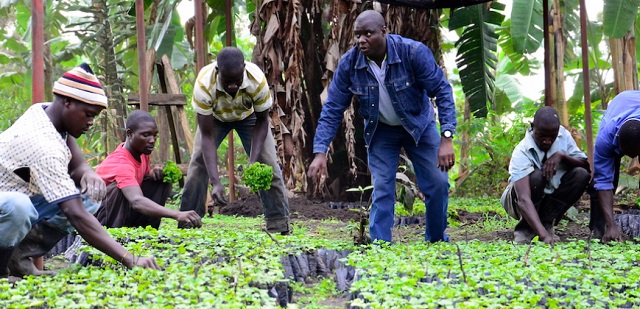
COMMENT | ROBERT KABUSHENGA | The current coffee debate started in December 2019 with the controversial Bill that later became law. Since then, some of us who are active in different parts of the value chain have been exchanging ideas on what can be done. I am going to share them here
We had hoped that there would be a forum where we can then share our thinking. Apart from the parliamentary committee on the Vinci Deal, we have simply been dismissed as foreign agents, parasitic and myopic. They see no use in engaging those who actually generate the coffee wealth
Those of us invested in the coffee sector take a 20 (or more) years perspective. You can’t do that with myopia. We are involved in production of wealth so u can’t say that is parasitic. Ours is for export so we are working for ourselves not foreigners.
#UGCoffee Thread:
Guys, the current coffee debate started in Dec. 2019 with the controversial Bill that later became law. Since then, some of us who are active in different parts of the value chain have been exchanging ideas on what can be done. I am going to share them here— Robert Kabushenga (@rkabushenga) July 28, 2022
Only those whose income and livelihood derives from taxes and levies can be correctly described as parasites. They are the ones who need to work for foreigners from whom they can extract ‘rents’. Which is why they focus on the deals and are shortsighted in their outlook.
Anyway, what would we coffee sector players want to see?
1. We are in full agreement with the need to set up a soluble coffee plant. In fact I have been lobbying for this in some corridors. It will increase the value of low grade coffees that are fetching low prices in the market. The best option is a freeze dried coffee plant which gives the best instant coffee product. The model should be a PPP that invests in the plant but allows coffee final product entrepreneurs to rent time on the plant and produce their own coffee brands and market to the final consumer. This will spur local innovation in the local coffee values chain and generate diverse and more meaningful employment opportunities. It will also grow local consumption since soluble coffee is more convenient to make. This is especially true for those who make coffee in their homes.
2. The other opportunity is that those who invest in Uganda coffee processing for the final consumer is the African Continental Free Trade Area (AfCFTA). It means that we can position in urban markets across Africa but below the multinational processors. This would allow development of new markets as we build capacity to compete.
3. It is not enough to be outraged by the low income/prices we get for our coffee. That should not be the only driver for the decision to go to market with processed. For a start we have undercut our marketing scope by exiting the International Coffee Organization (ICO) and yet think we can grow coffee buyers.
4. We must look at our current market. Uganda is a net coffee exporter. We sell our coffee mainly to processors. This requires us to know how they want their product. Imposing a product in a consumer could backfire. To go directly to end user market means to know how coffee is consumed. It may be that by processing for export in the manner we claim will earn us more money may have the opposite effect. Processing may come at a high cost and will make our coffee expensive. Market entry barriers are higher in this segment which denies us access to this lucrative market.
5. Coffee is a sensitive food product whose consumers have peculiar consumption tastes. Uganda is a landlocked country. The logistics of getting to the coast is an exercise in frustration. Locally, we have no food packaging industry to talk about. This complicates export of processed food.
6. For your information, there were earlier initiatives with taxpayers money invested setting up coffee processing outfits in consumer markets-Denmark, Egypt and China. We have private entrepreneurs already in processing of coffee for export. Some have been ruined. Have we assessed what happened?
7. There has been no marketing of our coffee to give it a unique standing. The processed coffee market is very unforgiving for those seeking to play here. Where is our coherent strategy in this regard? Over what sustained period will we invest in this to effect uptake of our coffee?

8. There are also the realities of international trade. We have been unable to resolve market access for food products with our immediate neighbors. How will we manage the barriers with the lackadaisical work ethic of public officials who should be out there creating market access. A simple example: Uganda has a high tariff on imported processed coffee. It is only fair to expect retaliation which will drive up the price of our coffee in those markets. There is the enduring issue of health concerns in consumer markets and our own weak standards regime.
9. There is the limited view that somehow value addition in coffee only happens with processing.
10. Actually value is added right from planting with field and plant management which has effect on yield. Yield is crucial to how much we earn. Quality is another hence post harvest handling. The policy confusion is derailing the sector and will undermine the processing agenda. Uganda Coffee Development Authority (UCDA) argued that the Vinci processing approach is very good. But now wants to do a consultancy on the viability of such a plant. Earlier this year they signed a similar deal with Russians.
11. There is also the reality of the tight grip that coffee cartels have on the industry. Can we take them on without damaging ourselves? Do we have the muscle to dismantle this stranglehold? In the current geopolitics is this a front we want to open?
10. One more thing. Final consumers of high grade coffees have developed new tastes and expectations. They want their coffee made out of freshly roasted beans. This means that this has to be done as close to the market as possible. So roasting is now localized and miniaturized for this.
The different players in the coffee sector working together are in much better position to deliver value addition for coffee in a more beneficial & sustainable way than any of the options being peddled
******
This article is curated from twitter handle @rkabushenga
The post COFFEE: Here is what should be done appeared first on The Independent Uganda:.
from The Independent Uganda: https://ift.tt/A3hL9fg
0 Comments